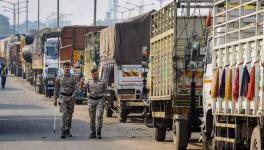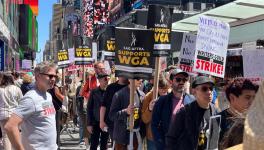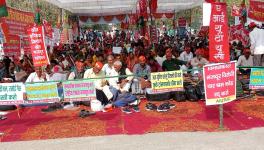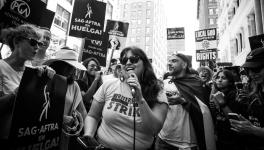Starbucks Union Files Labour Complaint, Alleges US Store Closures Retaliatory Move
Representational use only.Portside.Org
New Delhi: Starbucks Workers United (SBWU), which is pushing to unionise more than 130 US stores of the coffee chain in the US, has filed an unfair labour practice complaint with the National Labour Relations Board (NLRB) after Starbucks announced on Monday that will shut down 16 locations by July-end.
The union has alleged that Starbucks decided to close down the stores in retaliation to its employees at several locations joining unions. As of June 24, the NLRB certified unions at 133 stores with more than 3,400 hourly employees with lections under way at dozens of more locations.
In a letter sent to its employees on Monday, Debbie Stroud and Denise Nelson, senior vice-presidents of US operations, cited safety concerns as the reason for closing six stores each in Seattle and Los Angeles; two in Portland, Oregon; and locations in Washington, D.C. and Philadelphia, CNN Business reported.
Writing that Starbucks employees are “seeing first-hand the challenges facing our communities—personal safety, racism, lack of access to healthcare, a growing mental health crisis, rising drug use and more”—Stroud and Nelson added, “With stores in thousands of communities across the country, we know these challenges can, at times, play out within our stores too.”
In an email sent to CNN Business, a company spokesperson wrote: “After careful consideration, we are closing some stores in locations that have experienced a high volume of challenging incidents that make it unsafe to continue to operate.”
Out of the 16 stores, two in Seattle have unionised and one store in Portland is set for a union vote in August.
In a tweet, SBWU Seattle questioned the decision to close one of the stores in the city.
“Within the past six months, the employer closed and/or threatened to close, at least, 16 stores in order to discourage union activity, retaliate against workers engaged in union activity and/or escape its obligation to bargain with the Union,” reads the SBWU complaint, In These Times reported.
The complaint seeks injunctive relief for workers at the stores set for closure closed stores, which would fast-track a court order while the case is being litigated before the NLRB.
In a statement to In These Times on the decision, a Starbucks spokesperson said: “We’re empowering local leaders, who have emphasised repeatedly that they care deeply about creating a safe and welcoming environment in the community. The company is renewing its commitment to safety, kindness, and welcoming in our stores.”
Alleging that if Starbucks really cared about employee safety, it would not have decided to close the stores and instead bargained about ways to ensure their protection, Marina Multhaup, legal counsel for SBWU, told In These Times, “Recently in Seattle, Starbucks partners at seven stores went on strike partially in protest of safety conditions. Then Starbucks announced it was closing eight stores in the [Pacific Northwest] area.”
Josie Serrano, a Los Angeles SBWU organiser and employee at a store not slated for closure, said that safety concerns raised by the leadership are a reason why the stores are organising. “A lot of Starbucks stores do have high incidents,” Serrano said.
“That’s what a lot of stores are wanting to do by unionising. So, if we were able to have a fair shot at bargaining with the company over our safety concerns, we wouldn’t need to close the store because we would be able to add more security to these stores,” Serrano added.
Cat Ureta, a barista at the unionised East Olive Way store, Seattle, was surprised to hear that it would be shut down as it didn’t face as many security concerns as others. When she and her colleagues questioned the management, it cited the number and severity of incidents without providing specific details.
Since the store is unionised, the managers told Ureta and her colleagues, decisions about working hours, pay and transfer are subject to bargaining and not guaranteed.
The targeting of unionised stores was evident in May when the company announced wage hike for workers but said that it was prevented from assuring raises in stores that unionised or are in the process of unionising. In June Starbucks also hedged on offering abortion access benefits, including out-of-state travel expenses, to workers at unionised stores citing contact negotiations.
Demanding the extension of these benefits to unionised employees too, the SBWU wrote in May: “Starbucks is permitted by law to offer these benefits to workers at unionised stores. Our bargaining committees will demand that these modest improvements be given immediately to all the partners.”
In fact, Ureta claimed that she and her colleagues have been trying to bargain with Starbucks their unionisation in June but without any luck. “The fact that we are going into emergency bargaining over whether or not we’ll be able to even so much as stay at Starbucks is a little worrying when they’ve been ghosting everyone for months and months,” she said.
The SBWU had alleged earlier as well that Starbucks shuts down stores to suppress organising. Issuing a wide-reaching complaint on behalf of unionised stores in the Buffalo, New York, the NLRB in May alleged that two stores were shut down soon after unionisation.
In June, Starbucks workers at an Ithaca, New York, store made a similar allegation when it was shut down. Filing an unfair labour practice complaint with the NLRB, they alleged that Starbucks was making a “clear attempt to scare workers across the country”.
The decision to shut down the stores comes after Howard Schultz joined as CEO for the third time in April and tried to dissuade workers from unionising even before his appointment.
In a letter, sent to the employees on Monday, Schultz wrote: “We need to reinvent Starbucks for the future.”
Asking employees to “modernise and transform the Starbucks experience in our stores and recreate an environment that is relevant, welcoming and safe, and where we uplift one another with dignity, respect and kindness,” Schultz wrote: “We are now laying the foundation for the next Starbucks—a company even more true to our shared mission: to inspire and nurture the human spirit—one person, one cup and one neighbourhood at a time.”
Outlining the “reinvention plan”, Schultz wrote: “It begins with five bold moves. We will: Re-envision how we bring our mission to life. Renew the well-being of retail partners by radically improving their experience. Reimagine our store experience for greater connection, ease and a planet positive impact. Reconnect with our customers by delivering memorable and personalised moments. Redesign partnership by creating new ways to thrive together.”
New Delhi: Starbucks Workers United (SBWU), which is pushing to unionise more than 130 US stores of the coffee chain in the US, has filed an unfair labour practice complaint with the National Labour Relations Board (NLRB) after Starbucks announced on Monday that will shut down 16 locations by July-end.
The union has alleged that Starbucks decided to close down the stores in retaliation to its employees at several locations joining unions. As of June 24, the NLRB certified unions at 133 stores with more than 3,400 hourly employees with lections under way at dozens of more locations.
In a letter sent to its employees on Monday, Debbie Stroud and Denise Nelson, senior vice-presidents of US operations, cited safety concerns as the reason for closing six stores each in Seattle and Los Angeles; two in Portland, Oregon; and locations in Washington, D.C. and Philadelphia, CNN Business reported.
Writing that Starbucks employees are “seeing first-hand the challenges facing our communities—personal safety, racism, lack of access to healthcare, a growing mental health crisis, rising drug use and more”—Stroud and Nelson added, “With stores in thousands of communities across the country, we know these challenges can, at times, play out within our stores too.”
In an email sent to CNN Business, a company spokesperson wrote: “After careful consideration, we are closing some stores in locations that have experienced a high volume of challenging incidents that make it unsafe to continue to operate.”
Out of the 16 stores, two in Seattle have unionised and one store in Portland is set for a union vote in August.
In a tweet, SBWU Seattle questioned the decision to close one of the stores in the city.
“Within the past six months, the employer closed and/or threatened to close, at least, 16 stores in order to discourage union activity, retaliate against workers engaged in union activity and/or escape its obligation to bargain with the Union,” reads the SBWU complaint, In These Times reported.
The complaint seeks injunctive relief for workers at the stores set for closure closed stores, which would fast-track a court order while the case is being litigated before the NLRB.
In a statement to In These Times on the decision, a Starbucks spokesperson said: “We’re empowering local leaders, who have emphasised repeatedly that they care deeply about creating a safe and welcoming environment in the community. The company is renewing its commitment to safety, kindness, and welcoming in our stores.”
Alleging that if Starbucks really cared about employee safety, it would not have decided to close the stores and instead bargained about ways to ensure their protection, Marina Multhaup, legal counsel for SBWU, told In These Times, “Recently in Seattle, Starbucks partners at seven stores went on strike partially in protest of safety conditions. Then Starbucks announced it was closing eight stores in the [Pacific Northwest] area.”
Josie Serrano, a Los Angeles SBWU organiser and employee at a store not slated for closure, said that safety concerns raised by the leadership are a reason why the stores are organising. “A lot of Starbucks stores do have high incidents,” Serrano said.
“That’s what a lot of stores are wanting to do by unionising. So, if we were able to have a fair shot at bargaining with the company over our safety concerns, we wouldn’t need to close the store because we would be able to add more security to these stores,” Serrano added.
Cat Ureta, a barista at the unionised East Olive Way store, Seattle, was surprised to hear that it would be shut down as it didn’t face as many security concerns as others. When she and her colleagues questioned the management, it cited the number and severity of incidents without providing specific details.
Since the store is unionised, the managers told Ureta and her colleagues, decisions about working hours, pay and transfer are subject to bargaining and not guaranteed.
The targeting of unionised stores was evident in May when the company announced wage hike for workers but said that it was prevented from assuring raises in stores that unionised or are in the process of unionising. In June Starbucks also hedged on offering abortion access benefits, including out-of-state travel expenses, to workers at unionised stores citing contact negotiations.
Demanding the extension of these benefits to unionised employees too, the SBWU wrote in May: “Starbucks is permitted by law to offer these benefits to workers at unionised stores. Our bargaining committees will demand that these modest improvements be given immediately to all the partners.”
In fact, Ureta claimed that she and her colleagues have been trying to bargain with Starbucks their unionisation in June but without any luck. “The fact that we are going into emergency bargaining over whether or not we’ll be able to even so much as stay at Starbucks is a little worrying when they’ve been ghosting everyone for months and months,” she said.
The SBWU had alleged earlier as well that Starbucks shuts down stores to suppress organising. Issuing a wide-reaching complaint on behalf of unionised stores in the Buffalo, New York, the NLRB in May alleged that two stores were shut down soon after unionisation.
In June, Starbucks workers at an Ithaca, New York, store made a similar allegation when it was shut down. Filing an unfair labour practice complaint with the NLRB, they alleged that Starbucks was making a “clear attempt to scare workers across the country”.
The decision to shut down the stores comes after Howard Schultz joined as CEO for the third time in April and tried to dissuade workers from unionising even before his appointment.
In a letter, sent to the employees on Monday, Schultz wrote: “We need to reinvent Starbucks for the future.”
Asking employees to “modernise and transform the Starbucks experience in our stores and recreate an environment that is relevant, welcoming and safe, and where we uplift one another with dignity, respect and kindness,” Schultz wrote: “We are now laying the foundation for the next Starbucks—a company even more true to our shared mission: to inspire and nurture the human spirit—one person, one cup and one neighbourhood at a time.”
Outlining the “reinvention plan”, Schultz wrote: “It begins with five bold moves. We will: Re-envision how we bring our mission to life. Renew the well-being of retail partners by radically improving their experience. Reimagine our store experience for greater connection, ease and a planet positive impact. Reconnect with our customers by delivering memorable and personalised moments. Redesign partnership by creating new ways to thrive together.”
Get the latest reports & analysis with people's perspective on Protests, movements & deep analytical videos, discussions of the current affairs in your Telegram app. Subscribe to NewsClick's Telegram channel & get Real-Time updates on stories, as they get published on our website.
























